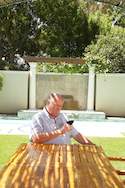Neil Ellis is renowned and much admired for his mentorship. Like everything he does, he takes it seriously and approaches it with intensity. Young winemakers who have worked with him at some stage during their careers comment on him as an exceptional example of discipline. It's said with deep felt appreciation and enormous respect for his rare combination of academic application and practical know-how.

For Neil, it's never been about the winemaker, but rather about the entire process: he's been described as 'the winemaker's winemaker. These days, he notes, everyone wants to be one. 'But what about the viticulturists, soil scientists, marketers, researchers, and educators ... it's about the big picture. There's so much more to it than just making wine...'
For him, it begins with agriculture: knowing the land, the weather, the soil, the vine, the grape in all its extraordinary versatility and endless possibilities. Then there's the art of winemaking, which lies in blending: working with different varieties and clones that give different aromas and flavours, for different styles of wine, even when it comes to single-varietal wines.
This is followed by science, which is where the winemaker 'adds quality': having the technological expertise to know how to capture the desired or best expression of any particular wine in the bottle.
Neil is a graduate of Elsenburg Agricultural College, after which he was employed by KWV as a 'trainee cellarmaster'. It was an environment in which he was strongly influenced by 'some of the great wine people of the day: Dr. Pan van Zyl, Willie Hacker, Pietie Theron, Chari Theron, and Dr. Charlie Niehaus, whom I also got to know.
'It was only in my second year at KWV, I think, that it became clear to me that wine really was my thing.'
He is a child of the fifties, born in Cape Town of an English father and Afrikaans mother. He started school at Ellerton Primary in Sea Point until his parents moved across Table Bay to Milnerton and he was sent to boarding school at Huguenot High in Wellington in the Cape Winelands.
Neil continued his winemaking career at historic Groot Constantia. He made the farm's, and the valley's first sauvignon blanc and Rhine riesling in an area then associated with red wine, while its cool, maritime influence climate was to eventually be recognised as one of the Cape's premier terroirs for top-quality whites also.
Those early classic varietal whites earned him a label as a 'white wine man'. 'Not entirely accurate,' he points out, as he has always enjoyed working with and achieved equal success with reds, particularly cabernet sauvignon and shiraz. 'It was my Constantia experience that got me looking for other cool-climate spots, for whites and reds, and led me to Elgin and then Groenekloof in Darling.'
He left Constantia when Gilbert Colyn, the architect responsible for Groot Constantia's imposing new cellar during Neil's tenure, asked the young winemaker to help him develop a winery on Zevenwacht, a new wine entity on the hills linking Bottelary and Stellenboschkloof.
'One of the best terrains around,' Neil remembers. 'And it was a groundbreaking idea of his to tie in a wine farm with a residential estate with buy-in from the residents. But the operation was just too big for me to enjoy.' He had already considered doing his own thing, and negotiated a deal with Colyn to use a corner of the Zevenwacht cellar to vinify his first Neil Ellis Vineyard Selection wine (a Cabernet Sauvignon) in 1984. 'I owe much to Colyn for what was then a rare opportunity.'
 Grilled fresh snoek with apricot and lemon basting sauce served with sweet potato au gratin by Neil Elis paired with Neil Ellis Stellenbosch...
Grilled fresh snoek with apricot and lemon basting sauce served with sweet potato au gratin by Neil Elis paired with Neil Ellis Stellenbosch... Neil Ellis’s marinated barbecued springbok fillet recipe paired with Neil Ellis Vineyard Selection Cabernet Sauvignon....
Neil Ellis’s marinated barbecued springbok fillet recipe paired with Neil Ellis Vineyard Selection Cabernet Sauvignon....